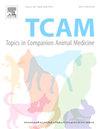Highly conserved prion protein sequences in random bred cats with three novel synonymous PRNP gene variants
IF 1.3
3区 农林科学
Q2 VETERINARY SCIENCES
引用次数: 0
Abstract
Transmissible spongiform encephalopathies are infectious, fatal, neurodegenerative diseases that affect both humans and animals. They occur as a result of misfolding of prion protein. In some species, variations in prion protein gene (PRNP) were associated with susceptibility to prion diseases. To date, only a few studies have investigated prion protein in cats. For this reason, this study aims to identify feline PRNP polymorphisms in random-bred cats. DNA isolation, PCR and 922 bp amplicon sequencing were performed in order to detect PRNP gene variants in 74 cat samples collected from Istanbul, north-western part of Turkey. Results were evaluated by using SPSS 25.0, HAPLOTYPE ANALYSIS 1.05, DnaSP v6, SRPLOT and PHYLOVIZ Online. In total, eleven polymorphisms including 10 SNPs and a 27 bp in/del polymorphism in the tandem repeat region were observed. Three of these SNPs, c.201C>A, c.225C>T, c.228A>C, were detected for the first time. All SNPs in the open reading frame were synonymous, so no amino acid variation was detected in the prion protein sequence. A total of 28 haplotypes were observed, including 8 major haplotypes with frequencies ≥ 0.05. The results indicating that the prion protein is conserved in cats from north-western Turkey, in contrast to other samples from this country, point to possible differences in the PRNP gene between relatively closely located populations.
具有三个新的同义PRNP基因变体的随机繁殖猫的高度保守的朊病毒蛋白序列。
传染性海绵状脑病是一种传染性、致命性的神经退行性疾病,可影响人和动物。它们是朊病毒蛋白错误折叠的结果。在一些物种中,朊蛋白基因(PRNP)的变异与朊病毒疾病的易感性有关。迄今为止,只有少数研究调查了猫的朊病毒蛋白。因此,本研究旨在确定随机繁殖猫的猫PRNP多态性。对采集自土耳其西北部伊斯坦布尔的74只猫进行了DNA分离、PCR和922 bp扩增子测序,以检测PRNP基因变异。采用SPSS 25.0、HAPLOTYPE ANALYSIS 1.05、DnaSP v6、SRPLOT和PHYLOVIZ Online软件对结果进行分析。共观察到11个多态性,包括10个snp和一个27 bp的串联重复序列的In /del多态性。其中,C . 201c >a、C . 225c >t、C . 228a >c三个snp为首次检出。开放阅读框中的所有snp都是同义的,因此在朊病毒蛋白序列中未检测到氨基酸变异。共检测到28个单倍型,其中频率≥0.05的主要单倍型8个。结果表明,与来自该国的其他样本相比,朊病毒蛋白在土耳其西北部的猫中是保守的,这表明PRNP基因在相对接近的种群之间可能存在差异。
本文章由计算机程序翻译,如有差异,请以英文原文为准。
求助全文
约1分钟内获得全文
求助全文
来源期刊

Topics in companion animal medicine
农林科学-兽医学
CiteScore
2.30
自引率
0.00%
发文量
60
审稿时长
88 days
期刊介绍:
Published quarterly, Topics in Companion Animal Medicine is a peer-reviewed veterinary scientific journal dedicated to providing practitioners with the most recent advances in companion animal medicine. The journal publishes high quality original clinical research focusing on important topics in companion animal medicine.
 求助内容:
求助内容: 应助结果提醒方式:
应助结果提醒方式:


